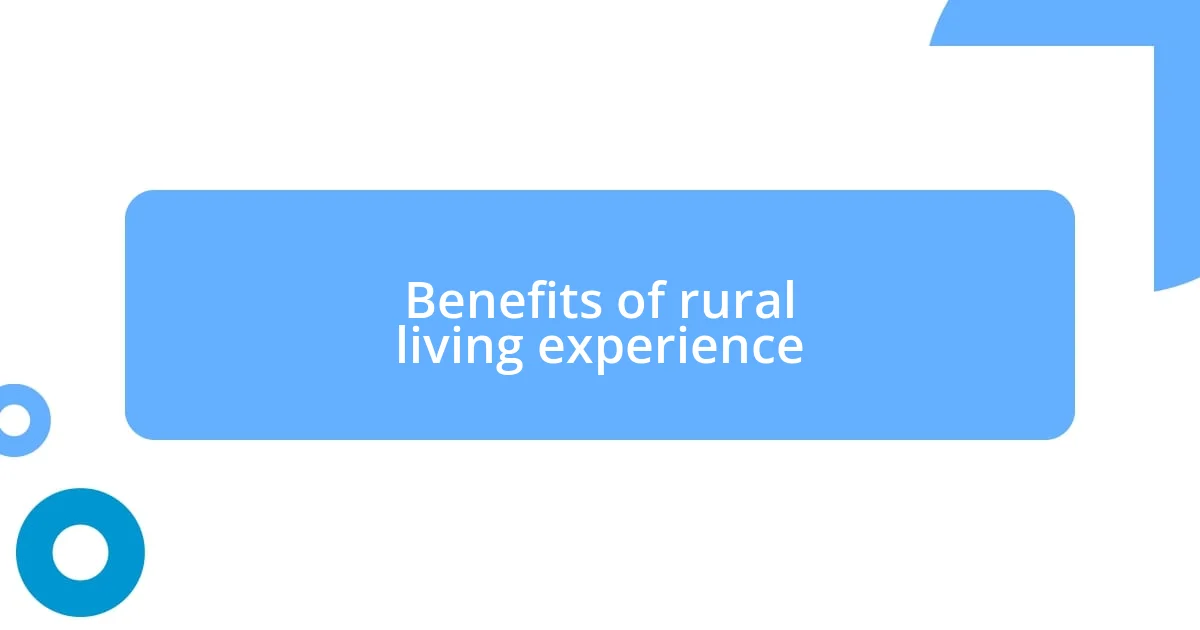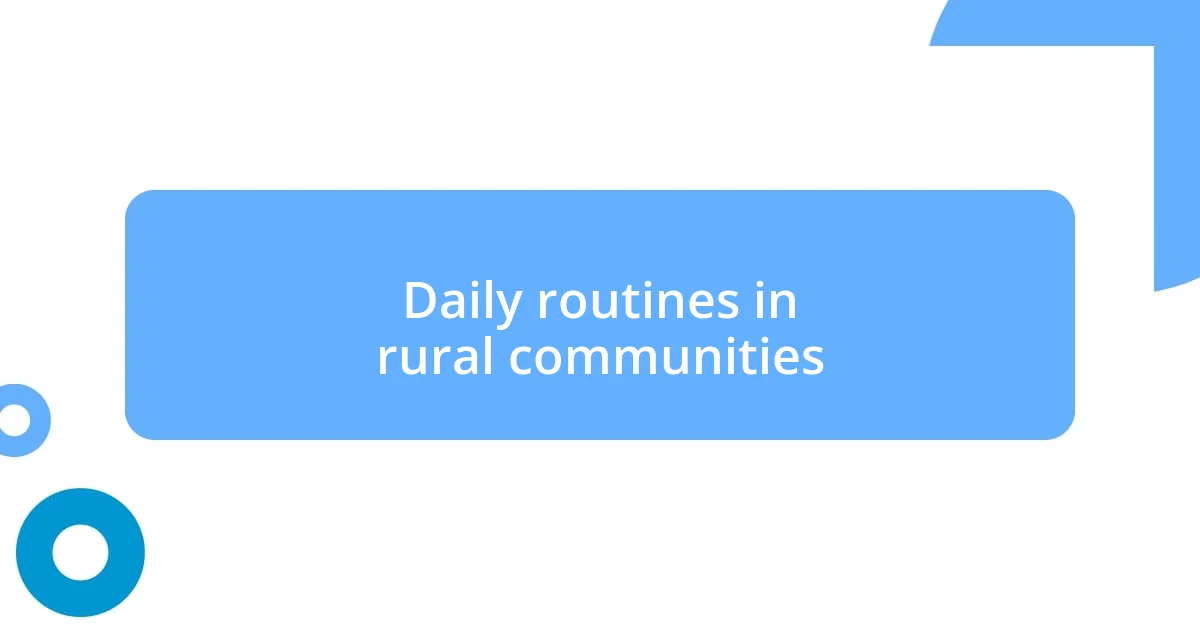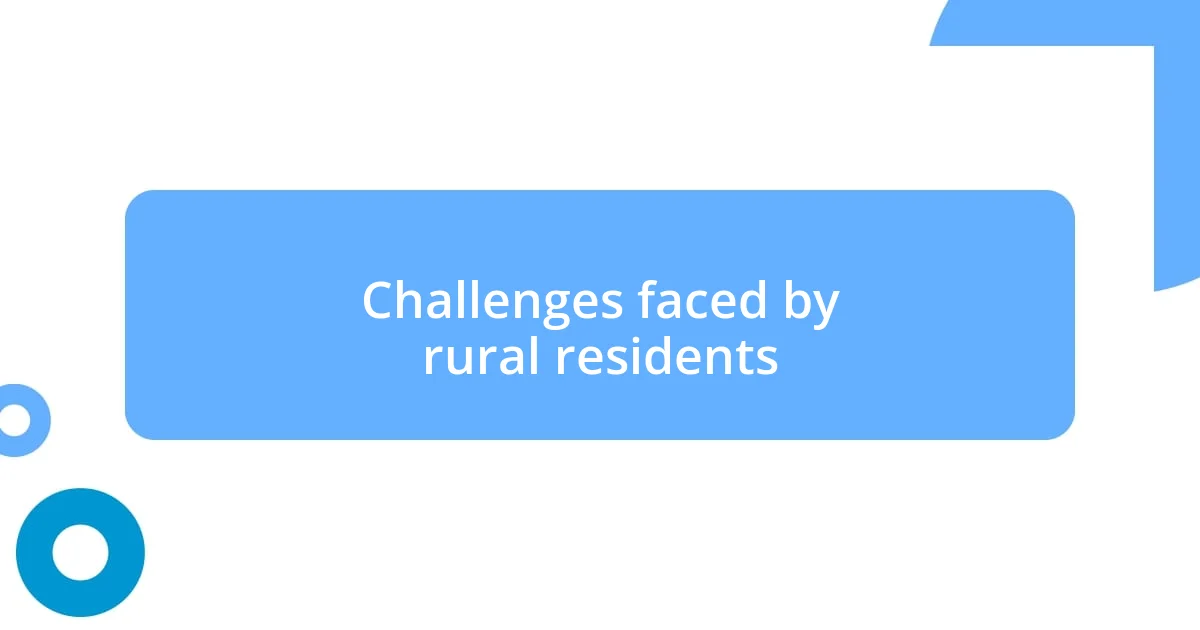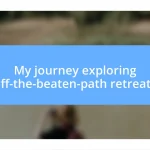Key takeaways:
- Rural life fosters a strong sense of community, marked by personal connections, shared experiences, and support networks.
- Living in rural areas offers tranquility and an intimate connection with nature, enhancing overall well-being and fostering mindfulness.
- Despite its charms, rural living presents challenges such as limited healthcare access, transportation issues, and feelings of isolation, necessitating community reliance and creativity in problem-solving.

Understanding rural life dynamics
Living in a rural community is like being part of a closely-knit family. I remember my first summer here; neighbors dropped by with fresh vegetables from their gardens, and I felt an overwhelming sense of connection. How often do you get that in a city? It’s that kind of interaction that reveals the heart of rural life—the shared stories and collaborative spirit that bind us together.
Another dynamic I’ve come to appreciate is the rhythm of life that’s dictated by nature rather than clocks. There’s something grounding about waking up to the sound of birds instead of car horns. Do you ever find peace in the simple things? For me, it’s in these moments—like watching the sunset while harvesting tomatoes—that I truly grasp the notion of living in harmony with the environment.
Moreover, the challenges faced within these communities foster a unique resilience and problem-solving mentality. I find it fascinating how resourcefulness is a way of life here. Have you ever had to rig something from what you have on hand? It seems that in rural settings, the need to adapt and innovate from limited resources cultivates a creative spirit that is both inspiring and empowering.

Benefits of rural living experience
Living in a rural area offers a sense of tranquility that’s often elusive in bustling cities. I recall my first morning sipping coffee on the porch, surrounded by the serene sounds of chirping birds and rustling leaves. It felt like a gentle reminder that life can be slower and more deliberate here—an aspect I deeply cherish. Have you ever felt the stress of urban life fade away? In rural living, those moments of calm are about more than just scenery; they’re about connecting to a lifestyle that prioritizes peace.
The sense of community in rural settings is something that can genuinely transform your life. I’ve joined local events, from potluck dinners to craft fairs, where everyone comes together to share not just food but experiences and laughter. It’s heartwarming to know that if I ever needed help, I could count on the people around me. Isn’t it comforting to feel that kind of safety? This kind of interconnectedness creates a support system that’s invaluable, fostering not just friendships but a deeper sense of belonging.
Another remarkable benefit is the access to nature. Every weekend, I venture out to hiking trails and open fields, where I can immerse myself in the simple beauty of the great outdoors. I’ve found that these experiences not only refresh my mind but also nourish my soul. Have you ever felt that buzz of energy when surrounded by nature? It’s a reminder of how vital it is to reconnect with the natural world. Truly, this connection enhances well-being and inspires a life filled with gratitude and mindfulness.
| Benefit | City Life | Rural Life |
|---|---|---|
| Community Connection | Often superficial and busy | Close-knit and supportive |
| Peace and Tranquility | Fast-paced and noisy | Serene and calm |
| Access to Nature | Limited green spaces | Abundant natural surroundings |

Daily routines in rural communities
Daily routines in rural communities often dance to the gentle rhythm of the natural world. I remember my neighbor, an early riser, always heading out with her coffee in hand before sunrise. She said that watching the first light break over the hills makes her day feel more purposeful. There’s something quite grounding about starting the day just as the world awakens—those quiet moments can set a positive tone that lasts.
Here are some typical daily routines you might find in rural areas:
- Morning Chores: Farmers often wake at dawn to tend to their livestock or crops, embracing the day’s tasks before breakfast.
- Community Engagement: There’s a rhythm of visiting neighbors—whether to exchange goods or share a chat, it’s an integral part of life.
- Nature Walks: Daily walks through fields or woods are common, encouraging connection with the local flora and fauna.
- Shared Meals: Families often gather at the end of the day to share stories and meals, fostering a strong sense of community and belonging.
- Local Markets: On weekends, many visit farmer’s markets, trading stories and fresh produce while supporting local agriculture.
The beauty of these routines lies not just in their tasks, but in the relationships they cultivate. I often join my friends for evening gatherings where we share our week’s highlights—there’s laughter, good food, and a kindness that lingers long after the night ends. Have you ever felt that your schedules are less about obligations and more like a comforting rhythm? These routines turn mundane activities into cherished traditions, weaving a rich tapestry of life that feels both simple and extraordinary.

Local traditions and cultural practices
Rural life is steeped in rich traditions that reflect the community’s values and history. For instance, I experienced my first harvest festival, and it was something I will never forget. The excitement in the air, with families showcasing their homemade goods and fresh produce, felt like attending a grand family reunion. Have you ever seen neighbors compete over who makes the best jam? In rural areas, these moments aren’t just about food; they’re a way of honoring the hard work that goes into farming and connecting people through shared pride and joy.
One of the most heartwarming local practices is storytelling around a fire. I remember my first evening at a neighbor’s bonfire, surrounded by warmth and laughter. Each person took turns sharing tales about their ancestors or amusing memories from past winters. It wasn’t just entertainment; it was a way to pass on wisdom and maintain a shared identity. Don’t you think there’s something magical about gathering and learning from one another? These tales often highlight the struggles and triumphs of a community, allowing newer generations to appreciate their roots.
Traditions related to holidays often take on unique flavors in rural settings. For instance, during Halloween, instead of a typical trick-or-treating experience, we have a costume parade at the town square. Everyone participates, fostering creativity that’s so vibrant you can almost feel it in the air. I vividly remember the joy on children’s faces as they hopped around in handmade costumes, while adults exchanged hearty laughter and hot cider. Isn’t it beautiful how these events create a sense of unity? Such traditions not only bring people together but also keep the spirit of community alive, reinforcing our connections to one another and to the land we call home.

Economic opportunities in rural areas
Economic opportunities in rural areas can be as diverse as the landscapes themselves. For example, when I moved to my small town, I discovered the potential for agribusiness. Many locals were leveraging the fertile land not just for crops but also for organic farming, producing everything from vegetables to artisanal cheeses. Have you ever tasted a farm-fresh cheese? The flavor is simply unparalleled, and it directly connects you to the hard work and creativity of those who made it.
Beyond agriculture, rural areas are increasingly becoming hubs for remote work. While I initially thought the lack of major corporations would limit job prospects, I found that many people were embracing the digital world. Friends of mine who once commuted for hours now work from their picturesque homes, drawing inspiration from nature instead of city landscapes. Isn’t it amazing how technology can bridge such distances? This shift has allowed community members to start their own businesses, whether it’s an online shop for handmade crafts or consulting services that cater to a wider audience.
Another fascinating opportunity lies in tourism and recreation. The natural beauty of rural areas attracts visitors looking for a peaceful getaway. I remember the thrill of watching my neighbor transform her property into a cozy bed-and-breakfast. It became a lovely haven for city dwellers seeking tranquility. The feedback she received wasn’t just about her hospitality; guests often raved about how their experience revived their souls. Have you witnessed the positive impact tourism can have on a community? It not only boosts the local economy but also fosters connections that enrich both visitors and residents alike, creating an exchange of stories, cultures, and friendships that last well beyond the stay.

Challenges faced by rural residents
Living in a rural area certainly comes with its set of challenges. One major issue I’ve faced is the limited access to healthcare. On one occasion, I had a minor health scare and had to drive over an hour to reach the nearest clinic. It’s moments like these that really make you appreciate the importance of readily available medical services. Have you ever found yourself wishing for a good doctor just a few minutes away? It can be frustrating and nerve-wracking, knowing that help isn’t just around the corner.
Transportation in rural areas can also be a real hurdle. I remember when my car broke down in the middle of nowhere; finding a mechanic who could come to my rescue felt like an adventure in itself! It took a few phone calls, and a wait that seemed like ages, until I finally got someone to help. The absence of public transport makes it challenging, especially for those without reliable vehicles. It makes me wonder how people manage—they really must rely on one another heavily.
Another challenge that often creeps up is isolation. While the stunning landscapes can be breathtaking, I’ve found that the expansiveness can also feel lonely at times. I recall a particularly quiet winter evening, where the stillness settled in a bit too heavy. It’s during those moments when you really crave connection. Do you ever feel the need to reach out and just share a laugh? I find that harnessing technology, like video calls with friends or joining local online groups, can ease that sense of solitude and foster a sense of community, even when physically apart.














